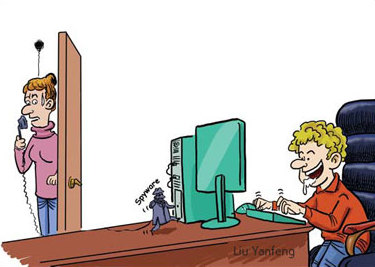Undercover parents of the cyber world
By Harlan Coben (China Daily)
Updated: 2008-03-18 07:26
Updated: 2008-03-18 07:26
Not long ago, friends of mine confessed over dinner that they had put spyware on their 15-year-old son's computer so they could monitor all he did online. At first I was repelled at this invasion of privacy. Now, after doing a fair amount of research, I understand.
Make no mistake: If you put spyware on your computer, you have the ability to log every keystroke your child makes and thus a good portion of his or her private world. That is what spyware is - at least the parental monitoring kind. You do not have to be an expert to put it on your computer. You just download the software from a vendor and you will receive reports - weekly, daily, whatever - showing you everything your child is doing on the machine.
Scary. But a good idea. Most parents will not even consider it.
Loving parents are doing the surveillance here, and most parents already monitor their children, watching over their home environment, their school.
Today's overprotective parents fight their kids' battles on the playground, berate coaches about playing time and fill out college applications -yet when it comes to chatting with pedophiles or watching beheadings or gambling away their entire life savings, then their children deserve independence?

Some will say that you should simply trust your children, that if they are old enough to go on the Internet they are old enough to know the dangers. Trust is one thing, but surrendering parental responsibility to a machine that allows the entire world access to your home borders on negligence.
Some will say that it is better just to use parental blocks that deny access to risky sites. I have found that they do not work. Children know how to get around them. But more than that - and this is where it gets tough - I want to know what is being said in e-mail and instant messages and in chat rooms.
There are two reasons for this. First, we have all read about the young boy unknowingly conversing with a pedophile or the girl who was cyber bullied to the point where she committed suicide. Would a watchful eye have helped? We rely in the real world on teachers and parents to guard against bullies - do we just dismiss bullying on the Internet and all it entails because we are entering difficult ethical ground?
Second, everything children type can already be seen by the world - teachers, potential employers, friends, neighbors, future dates. Should not they learn now that the Internet is not a haven of privacy?
One of the most popular arguments against spyware is the claim that you are reading your teenager's every thought, that in today's world, a computer is the little key-locked diary of the past. But posting thoughts on the Internet is not the same thing as hiding them under your mattress.
Maybe you should buy your children one of those little key-locked diaries so that they too can understand the difference.
Am I suggesting eavesdropping on every conversation? No. With new technology comes new responsibility. That works both ways. There is a fine line between being responsibly protective and irresponsibly nosy.
You should not monitor to find out if your daughter's friend has a crush on the boy next door or that a certain teacher assigns too much homework or what schoolmate snubbed your son. You are there to start conversations and to be a safety net. To borrow from the national intelligence lexicon - and yes, that is uncomfortable - you are listening for dangerous chatter.
Will your teenagers find other ways of communicating with their friends when they realize you may be watching? Yes. But text messages and cell phones do not offer the anonymity and danger of the Internet. They are usually one-on-one with someone you know. It is far easier for a predator to troll chat rooms and MySpace and Facebook.
There will be tough calls. If your 16-year-old son, for example, is visiting hardcore pornography sites, what do you do?
If something more graphic had been out there, we probably would have gone for it. Interest in those topics is natural. So start a dialogue based on that knowledge. You should have that talk anyway, but now you can have it with some kind of context.
Parenting has never been for the faint of heart. One friend of mine, using spyware to monitor his college-bound daughter found out that not only was she using drugs but she was sleeping with her dealer.
He wisely took a deep breath before confronting her. Then he decided to come clean, to let her know how he had found out, to speak with her about the dangers inherent in her behavior. He had these conversations before, of course, but this time he had context. She listened. There was no anger. Things seem better now.
Our knee-jerk reaction as freedom-loving Americans is to be suspicious of anything that hints at invasion of privacy. That is a good and noble thing. But it is not an absolute, particularly in the face of the new and evolving challenges presented by the Internet. And particularly when it comes to our children.
Do you tell your children that the spyware is on the computer? I side with yes, but it might be enough to show them this article, have a discussion about your concerns and let them know the possibility is there.
The New York Times Syndicate
(China Daily 03/18/2008 page10)
|
|
|
|